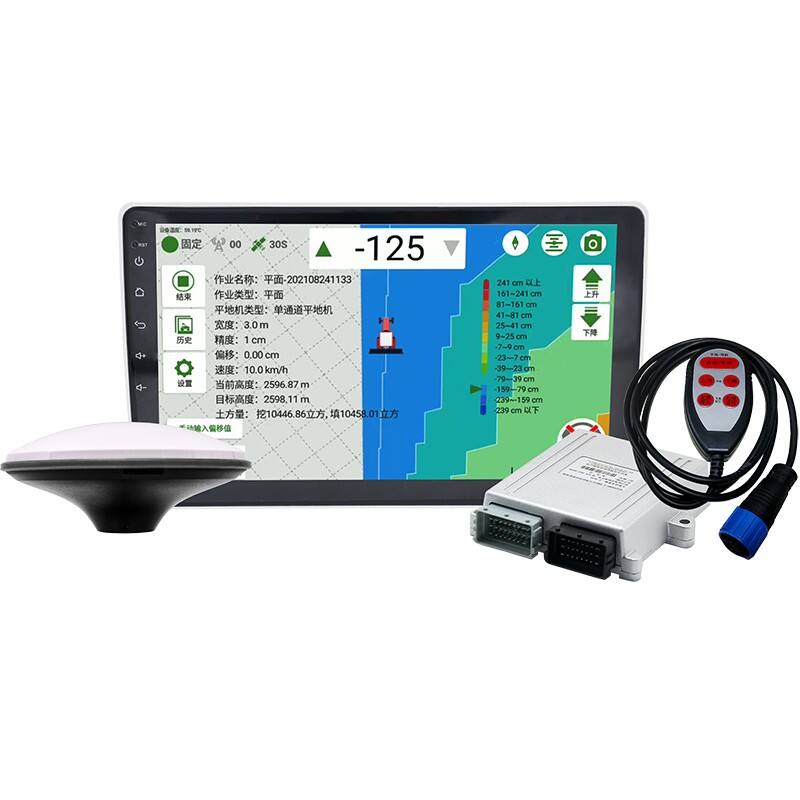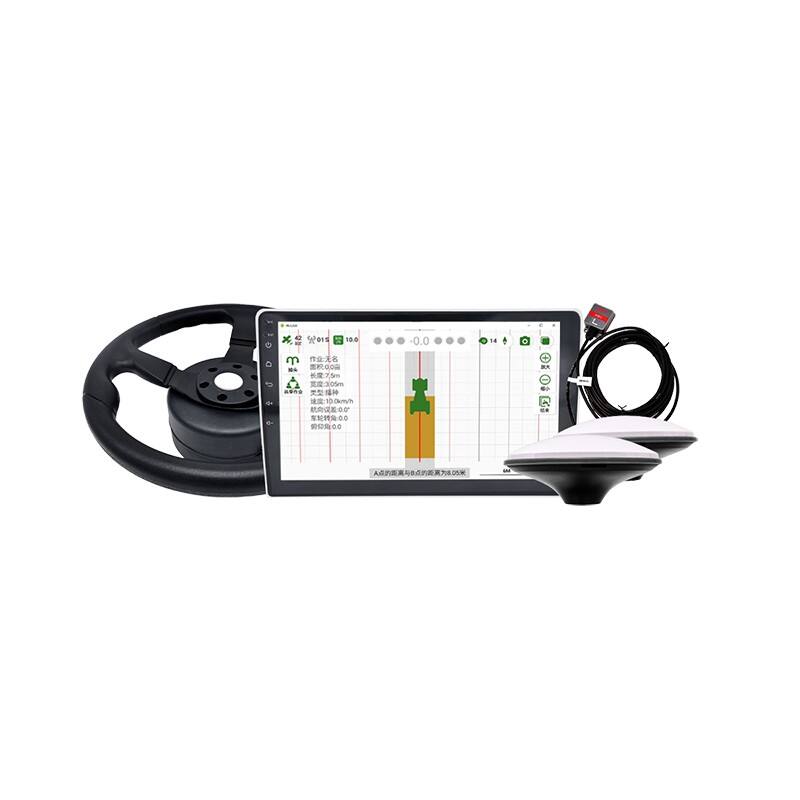RTK GPS stands for Real Time Kinematic Global Positioning System, and it's basically a fancy way of getting super accurate location data down to the centimeter level. The system works with two main parts: one fixed base station and a mobile unit called a rover. These work together to give much better navigation accuracy than regular GPS systems when working on farms. With this kind of pinpoint accuracy, farmers can adjust their equipment exactly where needed across fields. This means less overlap between passes, reduced fuel consumption, and ultimately saves money while making sure crops get treated properly throughout the growing season.
Precision farming uses tech to keep an eye on how different parts of a field are performing. When farmers bring in RTK GPS systems, they get real control over their resources. Labor costs go down because machines do the work more efficiently, and at the same time, harvests tend to be better too. Take fertilizer application for example. With accurate GPS readings, tractors know exactly where to spread nutrients based on soil conditions. Farmers aren't wasting product on areas that don't need it. The result? Money saved and less runoff going into nearby waterways. Most growers see this as winning on two fronts business wise and good for the land long term.
RTK GPS tech gives farmers a major boost in managing crops and getting better yields because it delivers spot-on data right when they need it. With this kind of accurate info at their fingertips, growers make smarter choices especially around those key moments like planting season or harvest time. That means less guesswork and more actual results from the fields. Take weed control for example. Instead of going off old estimates or gut feelings about soil moisture levels, farmers now have concrete numbers showing exactly where problems exist. This leads to much better timing for applying fertilizers or pesticides, which ultimately saves money while still maintaining good crop health across all acres worked.
RTK GPS systems actually save farmers quite a bit of money when looking at how well they manage resources. When there's less overlap during spraying and applying fertilizer, growers end up using far fewer chemicals overall. That cuts down significantly on what they spend for these materials. Plus, since everything gets applied exactly where it needs to go, tractors don't have to make extra passes across fields. Labor costs drop too because workers aren't spending time fixing mistakes from poor application. The whole operation becomes much smoother really. Farmers find themselves putting their money into actual productive work instead of wasting it on redundant tasks that just eat away at profits without adding any real value to crop yields.
Environmental sustainability is becoming increasingly important in agriculture, and RTK GPS systems offer real benefits in this area. These precision tools help reduce waste by optimizing how resources get used across fields. Farmers who adopt RTK GPS typically see less fertilizer and pesticide runoff since they can apply these inputs exactly where needed. This means lower expenses for farm operations while keeping harmful chemicals out of waterways and soil. The technology allows growers to work smarter rather than harder, boosting yields without compromising land quality. Many farmers find that implementing RTK GPS makes good business sense while also supporting greener farming methods that will matter even more as regulations tighten over time.
Farmers are finding RTK GPS tech game changing for their fields, especially when it comes to running those fancy automated machines around the place. When tractors and combines get pinpoint guidance from these systems, folks save tons of time and money because they don't need so many hands working the land manually anymore. What really stands out is how this tech keeps everything moving smoothly through workflows, letting machines do their thing without constant oversight, even when rain starts pouring down unexpectedly. The accuracy level we're talking about here means crops get planted exactly where they should be and harvested at just the right depth every single time, making farms run better than ever before while cutting waste across the board.
RTK GPS makes land planning and crop mapping much more accurate, something that's become essential in today's farming world. When farmers get detailed info about different soil types across their fields, they can actually adjust how they plant accordingly. For instance, some areas might need more water while others require different fertilizers. This kind of customization leads to better harvests overall. With such precise information from RTK GPS systems, crops get exactly what they need when they need it, so plants grow healthier and produce more efficiently. Beyond just boosting output, these GPS tools help cut down on wasted resources too, making farms run greener while still maintaining profitability.
Land leveling equipment for farms has become one of those smart investments that pay off over time, especially when they come with RTK GPS technology built in. Farmers know that getting fields level right matters a lot for proper water flow across the land and making sure crops grow evenly throughout the season. When these machines have RTK GPS systems installed, efficiency jumps around 30% according to field tests. They work well with different kinds of shovels and can handle pretty much any weather condition without missing a beat. This means farmers save money on fuel and labor while still getting the job done faster than traditional methods ever allowed.

Agricultural autonomous driving solutions simplify processes by being easy to install and not requiring extensive training, thus enhancing productivity without significant disruption. These systems, leveraging RTK GPS, enable precise and reliable navigation across fields, ensuring consistent and high-quality operations, vital for improving agricultural production efficiency and reducing labor intensity.

Controllers for precision agriculture are essential for integrating RTK GPS with other smart technologies like irrigation management and automated reporting systems. These controllers empower modern farmers with real-time data processing and intelligent resource management solutions, making them indispensable for enhancing farming efficiency and precision in field management tasks.

RTK GPS technology in precision agriculture looks set to make some pretty big strides going forward. We're seeing some exciting developments in satellite tech right now, especially when it comes to getting better signals that actually work reliably even in tough conditions. What this means for actual farmers? Well, they'll get much more accurate field maps and be able to monitor what's happening across their land with far greater detail than before. And there's something else coming too - new algorithms and machine learning tools specifically built for farm data analysis. These kinds of smart systems can help create customized farming plans that save money on resources while still boosting those all important crop yields. The real challenge will be making sure these high tech solutions actually work well in the messy reality of everyday farming operations.
When RTK GPS gets combined with new tech stuff like drones and artificial intelligence, it opens up some exciting possibilities for farmers wanting to get more precise with their operations. The whole package basically lets growers gather and process information on the spot, which means they can spot problems with pests, check soil conditions, and monitor plant health way better than before. Farmers who adopt this mix of technologies tend to see real improvements in how much they produce per acre while using resources more efficiently. Sure, there's still a learning curve involved, but many agricultural businesses are already seeing tangible results from these advanced systems that help them farm smarter rather than harder.
RTK GPS has become a game changer for many farmers looking to take their operations to the next level in precision agriculture. When fields are mapped with centimeter-level accuracy, there's less overlap between passes, fertilizer goes where it's needed most, and water usage drops significantly. Farmers who've made the switch report better crop yields across multiple seasons while cutting down on input costs. For anyone running a farm today, getting familiar with RTK systems makes good business sense. The technology helps level the playing field against larger operations and keeps smaller farms competitive. Looking ahead, those who embrace these tools now will be better positioned for whatever challenges climate change throws at agriculture in coming years.